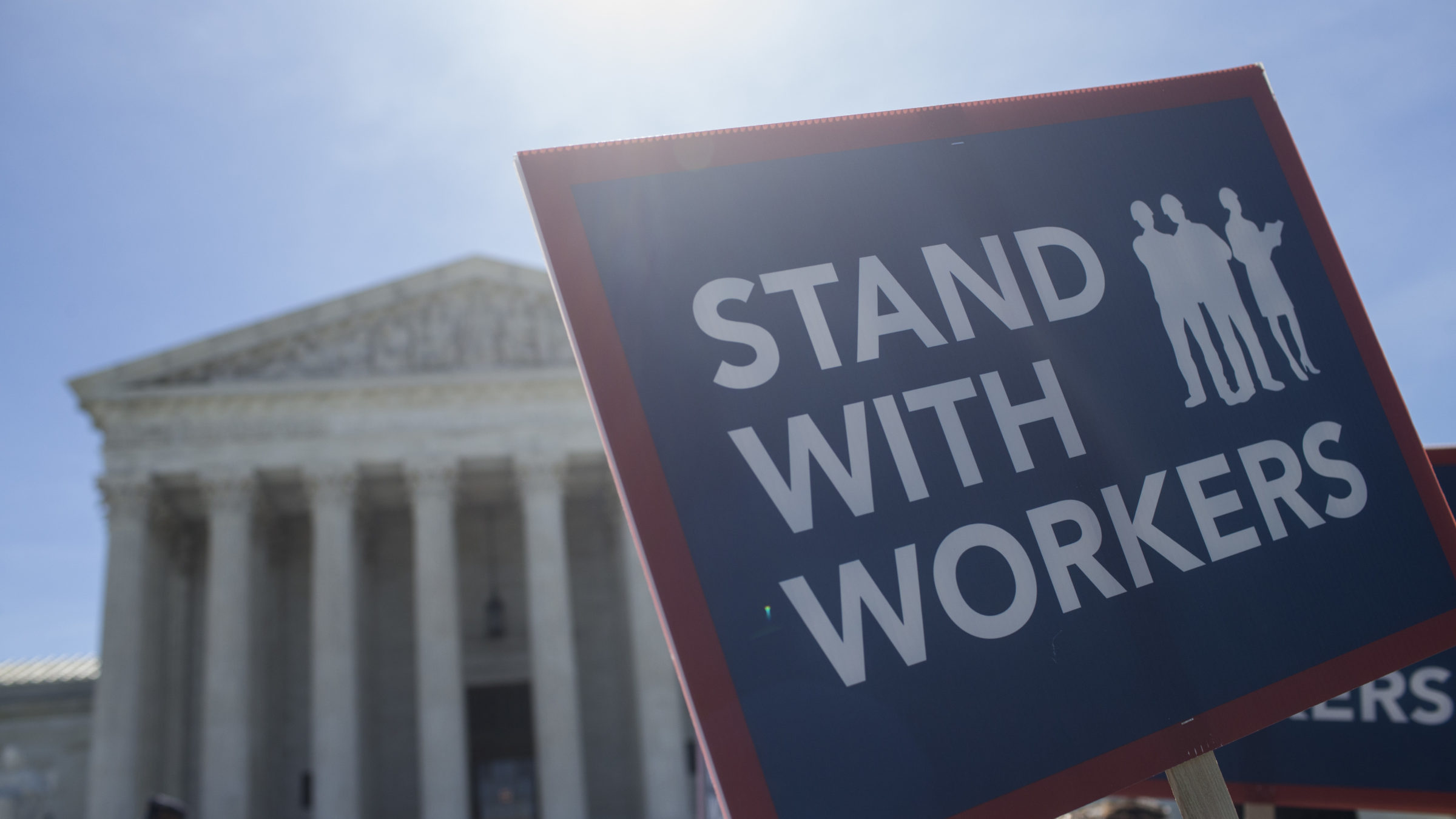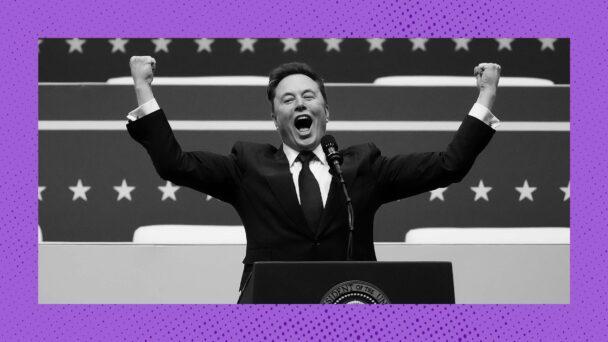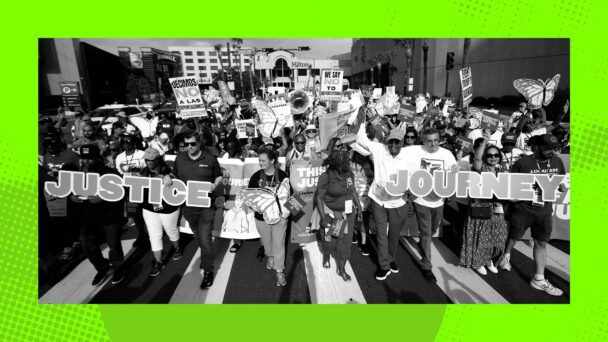The Fifth Circuit Court of Appeals recently granted famously bad boss Elon Musk the right to ignore labor laws, giving an early Christmas gift to big business in the process. A three-judge panel—comprised of Reagan appointee Jerry Smith, G.W. Bush appointee Leslie Southwick, and Obama appointee Stephen Higginson—unanimously ruled in favor of Tesla in its suit against the National Labor Relations Board (NLRB). The court held that the company can prohibit workers from wearing T-shirts with union insignia, and in so doing, stifle labor’s show of solidarity.
Under the National Labor Relations Act, employers, employees, and unions can ask the Board to investigate charges of unfair labor practices as possible violations of federal law. Here, the United Auto Workers (UAW) were trying to organize Tesla’s Fremont, California factory, where working conditions are notoriously grim. In 2017, the plant reported 722 injuries, or nearly two per day. And this was an undercount: it later turned out that Tesla was omitting hundreds of injuries when providing required data to the government. During the organizing effort, employees wanted to wear T-shirts with the UAW insignia. Tesla banned the shirts, so the UAW filed a complaint with the Board in 2017 alleging that the company was interfering with the employees’ rights to organize.
Wearing pro-union insignia at work is generally a legally protected activity, and has been since at least 1945 when the U.S. Supreme Court said as much. The ability to display union symbols is an important part of solidarity and collective action: it allows workers to signify support for organizing campaigns and to band together to advocate for safer working conditions. The NLRB ruled in favor of the workers, but the company appealed.

A protester holds a “Stand With Workers” sign in front of Supreme Court; unfortunately the courts cannot read
Tesla had argued to the Board that it had “special circumstances” to ban the UAW T-shirts. Its employees on the automotive factory floor are given uniforms that consist of four shirts and a sweater. And ostensibly, per Tesla, this “Team Wear” is extra-special and extra-necessary because any other clothes might “mutilate” the cars on the production line with abrasions, buffs, cuts, dents, and the like. The clothes are also color-coded based on job duty so management can discern who works where at a glance.
The Board dealt with the case for a staggering five years from filing to ruling, with a record running to several thousand pages and years’ worth of motions. The Board ultimately learned from Tesla factory managers’ testimony that there was no evidence of a black union T-shirt causing any mutilation and that they could manage employees perfectly well even without the color-coding. Tesla claimed it began to strictly enforce the prohibition on union T-shirts because of an increase in seat mutilations starting in 2017, but there was no evidence the union T-shirts caused the mutilations. Indeed, the Board found workers routinely wore shirts that were not black or had non-Tesla logos or emblems prior to 2017. With that, the Board rejected Tesla’s special circumstances argument. It also rejected the company’s argument that it didn’t have to allow T-shirts since employees could wear any number of union stickers, as the availability of other means of pro-union communication was irrelevant in determining whether Tesla broke the law.
Five years of extensive fact-finding affirming that cotton T-shirts do not mutilate cars did not sway the Fifth Circuit, however, which simply turned around and ignored it all. First, the panel said that Tesla’s prohibition on union shirts arose from the 2017 increase in seat mutilations, failing to mention the whole thing about how the T-shirts don’t mutilate anything and ignoring the Board’s finding that Tesla was fine with non-Team Wear shirts before the 2017 organizing effort. Then, it said that the uniform requirements allowed team leads to distinguish between types of workers, ignoring that the company’s managers had already said that wasn’t necessary.
Once you ignore the facts of a case, it’s easy to get the result you want. This has become a hallmark of conservative jurisprudence. Look at Kennedy v. Bremerton, where Justice Neil Gorsuch turned a football coach’s raucous fire and brimstone 50-yard-line Christian prayer jamboree into a “quiet prayer of thanks” to be able to rule that the coach’s First Amendment rights were violated and to further collapse the wall between church and state. In Sisters for Life. v. Louisville-Jefferson County, the Sixth Circuit ignored video evidence that “sidewalk counselors” routinely harassed, intimidated, and assaulted people going to an abortion clinic, instead agreeing with the self-reportage of the plaintiffs that they simply engaged in “quiet, caring, personal” chats.
On top of ignoring the underlying facts of the case, the Fifth Circuit panel also ignored the actual analysis in the NLRB decision, instead attributing to the NLRB a legal holding that is nowhere in the text of the Board’s opinion. The Board held that if an employer “interferes in any way with its employees’ right to display union insignia, the employer must prove special circumstances that justify its interference.” The Fifth Circuit panel held that this statement actually meant that “all uniforms are presumptively unlawful and must pass the special circumstances test.” This is a classic example of inventing something just to get mad at it, and it resulted in an incoherent ruling well-divorced from facts or law.
The court’s reasoning was, to put it squarely, a willful misunderstanding. As the Board explained in its opinion, companies can still have uniforms and dress codes that limit the display of union symbols as long as those policies are “narrowly tailored to serve a particular, legitimate interest that outweighs the adverse effects on employees’ rights.” Here, Tesla’s argument was that it had a legitimate interest—worry over mutilation—and, when that failed, it argued that employees’ right to wear union shirts didn’t matter as long as people could display stickers.
The Fifth Circuit waxed rhapsodic about how Tesla employees could put “as many stickers on the shirts as they wanted.” However, anyone with a toddler’s knowledge of stickers will note that stickers are raised off clothing, can bend back, could begin to lose adhesive and adhere instead to a car part, and so on, possibly causing the dreaded mutilation. Soft black cotton T-shirts do none of these things, be they union shirts or the other non-conforming shirts workers wore prior to spring of 2017. The panel was simply determined to find a way for Tesla to dictate how employees could express their union sentiments.
In the end, the Tesla case is about ensuring that Tesla got to control what employees did, even when it couldn’t come up with a rational reason to do so. It was a heavy lift for the court, requiring it to ignore law, facts, and history. The decision puts a huge thumb on the scale for already-powerful employers, which is exactly what the Fifth Circuit intended.




